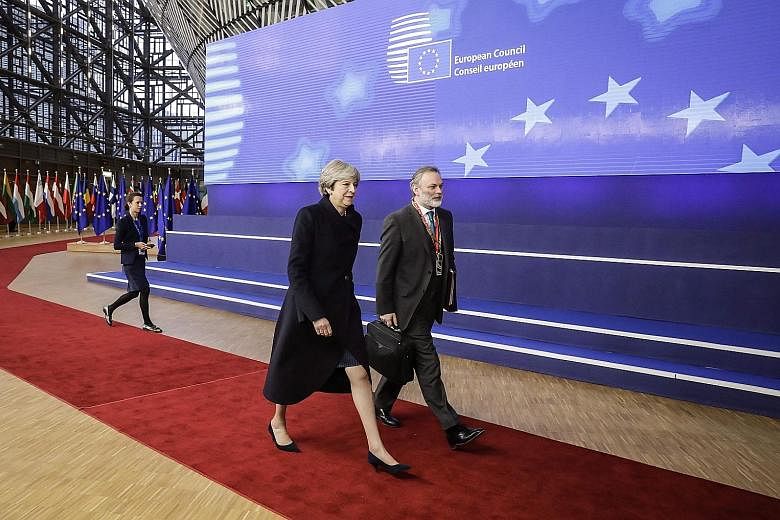BRUSSELS • The European Union agreed yesterday to move talks forward with London on Britain's exit from the bloc as leaders warmed to the British Premier, but there was little clarity on trade, as well as on some issues already discussed.
On the second day of a Brussels summit, EU leaders agreed "sufficient progress" was made after a deal on citizens' rights, the Irish border and Britain's outstanding payments, giving negotiators a mandate to move on to the main phase of talks.
A day after she suffered a defeat in Parliament over her blueprint for quitting the EU, Mrs Theresa May won applause from her peers on Thursday evening. "EU leaders agree to move on to the second phase of Brexit talks. Congratulations PM Theresa May," European Council president Donald Tusk, who chairs EU summits, said on Twitter.
Discussion of a transition period to calm nerves among businesses is due to start in the new year, although talks on a future free trade pact will not begin until after March - a date underlined by "guidelines" that set out how to proceed as Britain seeks to unravel more than 40 years of membership.
Mrs May replied via Twitter, thanking Mr Tusk and European Commission president Jean-Claude Juncker: "Today is an important step on the road to delivering a smooth and orderly Brexit and forging our deep and special future partnership."
Mr Tusk said the bloc would start "exploratory contacts" with Britain on what London wants in a future trade relationship, as well as discussion on a post-Brexit transition.
EU leaders used the nine-point guidelines they agreed at the summit to support Mrs May's call for a two-year transition out of the bloc, which aims to help British business and citizens adjust to life after the EU. They also reiterated their position that Britain cannot conclude a free trade accord with the EU until it has left and become a "third country".
EU officials are unsure exactly how far Britain should continue to receive the full economic benefits of EU membership during a transition after it leaves.
EU leaders, including Mr Juncker and Italy's Prime Minister Paolo Gentiloni, warned that the future partnership discussion is set to be difficult. Mrs May had departed the summit the night before.
Austrian Chancellor Christian Kern went further, saying even a primary school pupil could see that the "first phase" deal on the Irish border would come back to haunt the talks because it was impossible for Britain to leave the bloc's single market while avoiding a hard border on the island of Ireland.
Meanwhile, Ireland's Prime Minister Leo Varadkar cautioned that there were "quite divergent opinions" on how a new relationship and transition would look.
REUTERS

